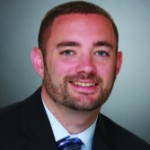 The industry event anyone in secured finance attends now celebrates its 77th year. SFNet is set to make the Arizona convention a memorable one. Click below to register.
The industry event anyone in secured finance attends now celebrates its 77th year. SFNet is set to make the Arizona convention a memorable one. Click below to register.

Kevin O'Malley
Of Counsel, Blank Rome LLP
40 Under 40 Category: Legal Services
Biography:
Kevin O’Malley is Of Counsel in Blank Rome’s Los Angeles office. He represents commercial banks, private equity groups and institutional lenders in structuring, documenting and negotiating commercial finance transactions, with a focus on asset-based and cash flow loans. Kevin joined Blank Rome’s Philadelphia office directly from law school in 2006 and relocated to the firm’s Los Angeles office in 2009 to service the firm’s West Coast clients and help establish the office’s financial services practice group. Kevin was recognized as a “Rising Star” by the Southern California Chapter of the Association of Corporate Counsel in 2012. He was elected of counsel in 2017. Kevin was previously an advisory board member of Back on My Feet (Los Angeles Chapter), a non-profit organization that combats homelessness through the power of running, community support and employment training. He was also a board member of MEND (Meeting Each Need with Dignity), a non-profit organization that assists individuals living in poverty. Finally, Kevin is co-founder, president and general counsel of Indie Brewing Company, a craft brewery and tasting room in downtown Los Angeles.
What role has mentoring played in your career?
The mentoring I’ve received at Blank Rome throughout my career is a significant factor in my success and in molding me into a lawyer who clients appreciate, trust and enjoy working with. Many of the attorneys in my practice group have been with Blank Rome their entire careers and as a result, place a premium on training young associates and developing their skills to ensure the future success of the young associates, the practice group and the firm.
When I first started practicing, I had no idea what qualities made a successful lawyer, especially a successful commercial finance lawyer. Fortunately, I was given the opportunity to work with a multitude of respected partners in both our financial services and bankruptcy/restructuring group. Through observing all of these different partners, I learned that there were many ways to draft and negotiate documents, communicate with clients and to close deals. Every attorney has his or her own style and methods and the key is finding the style that works best for you.
Early in my career I began working with a partner whose style and relaxed personality mirrored my own and he took me under his wing and gave me as much responsibility as I could handle (or enough rope to hang myself, depending on how you view it). He also took the time to involve me in all aspects of a transaction from term sheet to closing which I think was invaluable. I was also lucky to find a senior associate who taught me how to balance my time, prioritize work assignments, and deal with lifestyle issues that arise in the life of a young associate, all of which are essential to be successful. I attribute much of my success to these mentors and the lessons they taught me early in my career.
What is the best professional advice you have been given and how have you implemented it?
I think the best piece of advice I’ve been given is that our role as an attorney and advisor is to close the deal for our client. We need to ensure the transaction is done correctly and in a manner that protects our client but, if issues arise, we are engaged to analyze those issues (the quicker the better, of course) and arrive at a solution that satisfies all parties. After ten years of observing successful attorneys at Blank Rome and other firms, the ability to solve problems and be a facilitator is one characteristic that I believe sets attorneys apart. I have tried to implement this into my practice by never believing there is an issue that can’t be overcome. One of the things I enjoy about being an attorney, and especially a commercial finance attorney, is identifying solutions to problems or issues that may seem insurmountable or deal killers.
How did you wind up in the industry? We know most kids don’t say “I want to be in commercial finance when I grow up.”
I received a finance degree from Penn State but, after taking a job I was not very fond of, I decided to go to law school. During law school, I assisted a family friend in reviewing an asset-based loan he obtained for his business. It was my first exposure to fixed charge ratios, borrowing bases and other financial covenants, but I really enjoyed it because it combined my accounting and finance background with the legal concepts I was learning in law school. As a result, the commercial finance industry was near the top of my list for desired practice areas.
77th Annual Convention
 The industry event anyone in secured finance attends now celebrates its 77th year. SFNet is set to make the Arizona convention a memorable one. Click below to register.
The industry event anyone in secured finance attends now celebrates its 77th year. SFNet is set to make the Arizona convention a memorable one. Click below to register.
